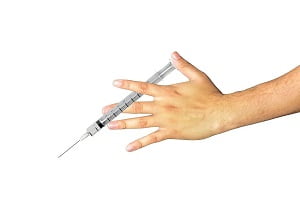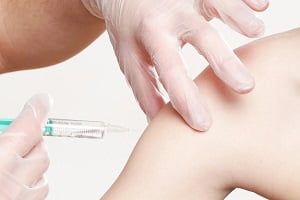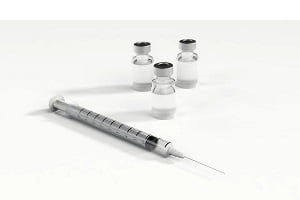Tetanus Adverse Reactions Following Tetanus Vaccination in Some People
- Updated on: Jul 6, 2024
- 4 min Read
- Published on Nov 9, 2020

Introduction
Clostridium tetani is a bacteria that causes tetanus infection. The bacteria enter the body via some wound caused by contaminated objects and produces toxins, often causing painful muscle contractions. Like other bacterial infections, tetanus is non-contagious and does transmit from an infected person to a healthy person. The bacterium is usually present in the soil, manure, and dust and invades the body through cuts on the skin or punctured wounds. The bacteria’s spores enter the body, grow into bacteria, and then produce a toxin known as tetanospasmin. Tetanus interferes with the ability to breathe and can also cause a deformity in the body’s posture.
Tetanus is also known as lockjaw (trismus) and is a severe medical condition. In this disease, chewing muscles get contracted and inflamed, causing trouble in mouth opening. Apart from the problem in opening the mouth, the patient suffers from other issues like eating and swallowing difficulty, maintaining oral hygiene, and speaking difficulty.
Tetanus vaccine provides immunity against the tetanus disease and is given to adults and children up to 7 years or more. The vaccine is given for tetanus and provides immunity against other bacterial infections like diphtheria and whooping cough.
Types of Tetanus Vaccines
There are three types tetanus vaccines:
Tdap: It is given to children older than seven years and adults and provides immunity against tetanus, diphtheria, and pertussis.
DTaP: It is given to children younger than seven years and provides immunity against all three diseases, i.e., tetanus, diphtheria, and pertussis.
DT and Td: This formulation protects against diphtheria and tetanus. Td is given to adults and older children while DT is given to younger children.
Side Effects of Tetanus Shots
Various side effects are found in people after receiving the tetanus shots. Usually all tetanus shots have common. Side effects are the sign that the body is responding against the vaccine and is preparing the immune system against these bacterial infections.
Common Side Effects
Fever: Mild fever can be experienced after the vaccination. Over the counter (OTC), drugs like ibuprofen and acetaminophen can be taken to reduce the body temperature back to normal. However, the temperature does not rise much and increases up to 38?C only.
Redness and Swelling at the Injection Site: Pain, swelling, and redness at the injection site are very common side effects after a tetanus shot. These side effects usually go away within a few days. Drugs like analgesics and antihistamines can help in providing relief from these symptoms.
Tiredness: It is ubiquitous to feel drowsy after the tetanus shot. It is a sign that the body is working to build immunity against the disease.
Headache and Body Ache: These side effects subside within a few days. Analgesics like ibuprofen and acetaminophen be taken to get relief.
Nausea, Diarrhea, and Vomiting: These side effects are caused after receiving the Tdap vaccine shot. In such cases, fluid intake, avoiding spices is recommended. Antiemetic and oral rehydration solution (ORS) can be taken to treat such side effects.
Severe and Rare Side Effects
Cardiovascular Complications: These mainly include hypotension in which the blood pressure drops from normal blood pressure. This can be mild, severe, or even life-threatening. Treatment for hypotension is necessary. If left untreated, it will cause more severe symptoms. Due to hypotension, the patient may often faint and fall, resulting in injuries. Due to hypotension, a proper amount of blood does not reach to brain and heart, leading to confusion, stroke, or even heart attacks. People suffering from hypotension post tetanus vaccination should regularly monitor their blood pressure and consult a doctor in case of emergency or when symptoms worsen.
Hypersensitivity: This includes anaphylactic reactions like hives, swelling of the mouth, difficulty in breathing, etc. Anaphylactic reactions are life-threatening and should be immediately treated. Asthma and heart disorders increase the risk of anaphylaxis. For such conditions, one shot of epinephrine can be administered. Anaphylaxis gets triggered when a person comes in contact with NSAIDs or aspirin and antibiotics.
Hives or urticaria may also be caused after tetanus vaccination. Hives can be of different sizes and can occur at any part of the body. It causes irritation and itching. Antihistamine drugs can be taken to cure it. It may subside after a few weeks.
Arthus type (type III) hypersensitive reaction may occur after 2-8 hours of toxoid booster administration. It is more common in people who had received prior boosters.
Dermatological Complications: Include redness, warmth, urticaria, edema, induration of skin, and rashes. Edema causes swelling throughout the body and is a sign of fluid retention in the body. The swelling may also be caused due to kidney or heart failure, liver, or thyroid disease. Sudden swellings around the lips or face are also some signs of edema. Besides, swelling in arms and legs can also occur.
Neurological Complications: There are various neurological complications associated with tetanus vaccinations.
Brachial Plexus Neuropathy: A network of nerves sends the signal to shoulders, arms, and hand from the spinal cord. This network of nerves is called the brachial plexus. Brachial plexus neuropathy occurs when this network of the nerves gets damaged, causing difficulty in the movement of the shoulders, arms, and hands. This causes severe pain and decreases sensitivity.
Cochlear Damage: Cochlea is a part of the inner ear, which is very small, having a snail-like shape, and plays an essential role in hearing. The damage of cochlea causes permanent hearing loss. This is also known as sensorineural hearing loss (SNHL). This is caused by loud noise exposure and the administration of powerful antibiotics. Many nerve cells called hair cells are present inside the cochlea and are responsible for detecting different sounds. Cochlear implants can be used as hearing aid in case of complete cochlea damage. A hearing aid that can amplify sound can be used in mild cochlea damage when only a few hair cells are damaged. As hair cells then require more sound to send the signal to the brain.
Guillain-Barre Syndrome: It is a rare disease that causes damage to nerves that help in locomotion and causes paralysis. This syndrome is caused when the immune system attacks nerve cells by mistake. It is more common in adults but can occur at any age.
Radial Nerve Paralysis: Radial nerve is present in the arm, wrist, and fingers. Damage in this nerve causes difficulty in the movement of fingers, wrists, and arms. This may also cause numbness.
FAQs
Can Tetanus Occur More Than Once?
Yes, tetanus can occur more than once because the tetanus vaccine does not provide immunity against the future infections
Does Tetanus Vaccine Cause Any Disease?
No, many mild and severe side effects can be caused after administering the vaccine, but this does not lead to any disease. All these symptoms can be controlled.
What are the Side Effects of the Vaccine?
There are various side effects of toxoid boosters like fever, headache, nausea, edema, hypotension, and nerve damage.
Who Should get These Vaccines?
An adult who wants to be protected from diseases like diphtheria, tetanus, and whooping cough can get this vaccination. Children can also get these vaccines when they are two months old. Regular boosters are needed throughout life.












